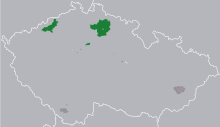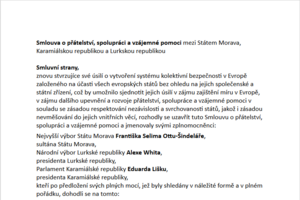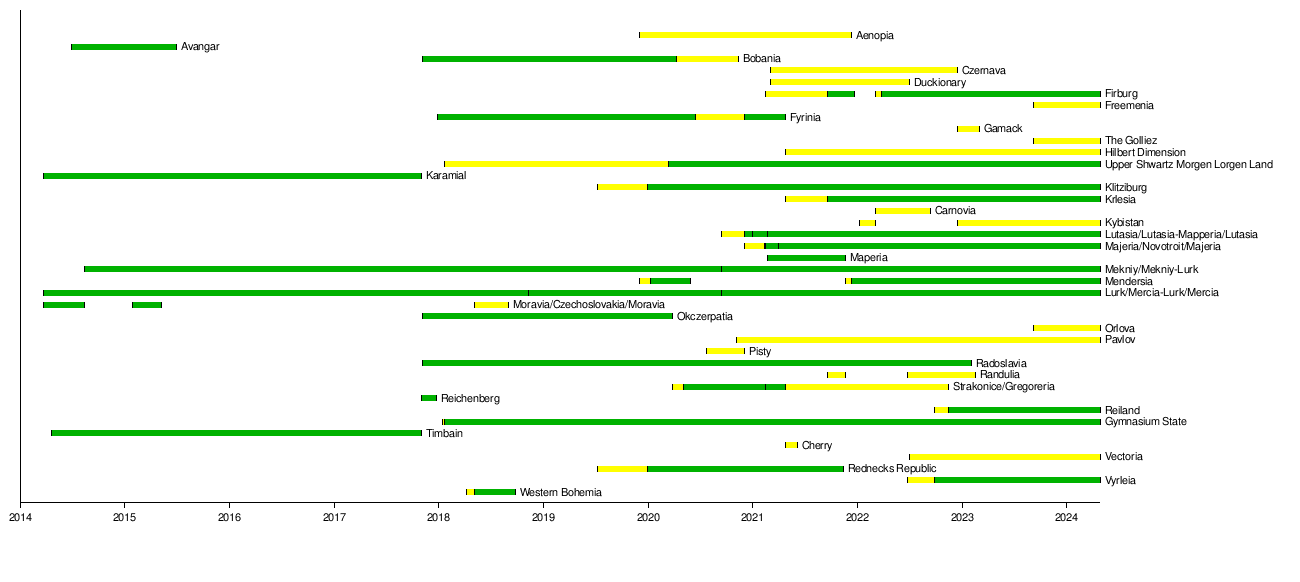Union of Micronations of Central Europe
Union of Micronations of Central Europe | |
|---|---|
 UMCE member states in the Czech Republic (March 2023) | |
| Membership |
|
| Leaders | |
| Stefan Kutnix | |
• Deputy Secretary | David of Reiland |
• Justice | Tomáš Falešník |
| Establishment | |
• UMBMSS creation | 4 January 2014 |
• Establishment of UMCE | 23 March 2014 |
• Internal reform | 22 September 2014 |
• Reformation | 7 November 2017 |
• Current treaty | 24 April 2021 |
The Union of Micronations of Central Europe, the official abbreviation UMCE (Czech: Unie mikronárodů střední Evropy, UMSE) is the name of a regional organisation comprising of micronations located in Central Europe, primarily in the Czech sector and the Polish sector. The organisation serves primarily to democratically resolve possible disputes between micronations, provide various services to the micronations and to serve as a discussion platform and an association of micronationalists in the geographical area of Central Europe. UMCE was founded on 23 March 2014 by the Treaty of Friendship, Cooperation and Mutual Aid, replacing the short-lived Union of Micronations of Bohemia, Moravia, Silesia and Slovakia. The current charter of the Union is the Treaty of Functioning of UMCE. As of February 2022, UMCE has 12 member and 4 observer states, the last micronation to join UMCE was the Kybistani National Republic.
History
Union of Micronations of Bohemia, Moravia, Silesia and Slovakia

On 3 January 2014, the Noble Republic of Lurk and the Republic of Moravia signed a treaty of Lurkish-Moravian friendship. The next day, on 4 January, both micronations expanded their relations with another multilateral treaty, which served as the basis for the Union of Micronations of Bohemia, Moravia, Silesia and Slovakia (Czech: Unie mikronárodů Čech, Moravy, Slezska a Slovenska, UMČMSS). The Karamial Republic was also invited, but it only joined after further negotiations on 11 January. UMČMSS did not last long, and was transformed into the Union of Micronations of Central Europe between March and July 2014.
First UMCE

Lurk, Moravia a Karamial signed the Treaty of Friendship, Cooperation and Mutual Aid on 23 March 2014, which formed the Union of Micronations of Central Europe ad an international organisation. Early UMCE adopted structure similar to the United Nations, with a Security Council with permanent and elected members. While UMCE lacked a formal head, Moravian president František Otta-Šindelář represented the organisation on most occasions. In June, more micronations joined, including Avangar or Mekniyan Mekkism. Moravia left the organisation with the creation of Union of Soviet Socialist Republics, which then formed Pact of Socialist Micronations as an alternative for and future successor of UMCE. Tensions between UMCE and USSR eventually escalated in Propaganda War between USSR and the Alliance of Three Nations. In September 2014, first UMCE projects including the UMCE Bank or Corona currency and online payment system.
Second UMCE

UMCE adopted the Treaty of Establishment of UMCE on 22 September 2014, which introduced the Secretary, sessions and other internal processes. The treaty consisted of mandatory sections, which all member states had to adhere to, and voluntary sections, which included provisions regarding membership in the Corona monetary union of common defense policy. Some of these elements were kept until today, in the form of associated organisations. UMCE terminated memberships of inactive micronations in March 2015, which only left Mekniy and Lurk in the organisation. The establishment of the Coronese Confederation therefore de facto replaced UMCE, it's venues however remained in use even in this time period.
Third UMCE

In October 2017 several new micronations were establishing in the Czech Republic. The Republic of Moravia initiated negotiations on a reform of the League of Micronations and invited former UMCE member states to take place in this project. Moravia wanted the new organisation to take form of a registered association on the Czech Republic (this idea was later dubbed "Moravian system"), Mekniy, with later support of Radoslavia (hence "Mekniyan-Radoslavian system"), instead supported structure similar to the old UMCE, without a legal counterpart under the Czech law and with associated organisations. Moravia eventually left the negotiations after disagreements with the other involved micronations. UMCE was ultimately restored on 7 November 2017 with a revised version of the Treaty of Establishment of UMCE, signed by Mekniy, Lurk, Radoslavia, Bobania, Reichenberg and Okczerpatia. Not too long after joining however, Reichenberg became in December the first micronation to willingly withdraw from the organisation. First half of 2018 saw Fyrinia and Gymnasium State join, and observership was implemented as a new step in achieving membership in the Union. Republic of Upper Shwartz Morgen Lorgen Land became the first micronation from outside the Czech Republic to become a member state. Activity however again declined later in 2018, leading to establishment of the Organisation of United Micronations.
UMCE started to became active again in 2019, when several micronations including the Rednecks Republic and Klitzibürg joined. Meanwhile, UMCE introduced a number of new project. In February 2020, Tomáš Falešník was elected as Secretary, succeeding Naemal Namul-den in the office. Organisation grew to 19 member or observer states, the highest since it's establishment. Falešník supported an extension of Mekniyan-Radoslavian system, sometimes called Mekniyan-Gymnasian system, that would allow for as high independence of associated organisations as possible, with the UMCE Council serving merely as an administrative body for the organisations. This resulted on 24 April 2021 in signing of the Treaty of Functioning of UMCE. Despite the custom of naming UMCE phases after charter reforms, the term "fourth UMCE" is unused for it's continuity with the third phase. Attempts to merge Organisation of United Micronations into UMCE and symbolically end the rivality between the organisations or to incorporate Concord pact as an associated organisation however both ultimately failed. Daniel Majer was elected Secretary in February 2022, the Union then played a small role in the Kybistani-Firburg Crisis. Majer however resigned in June citing personal reasons, and Tomáš Falešník became acting secretary only to appoint Jan Šťastný as the Deputy Secretary and resign too. During Šťastný's term, the organisation expanded further. During the Reilandian civil war, the Reilandian government's request for military intervention opened debate about establishment of a military associated organisation and adoption of a number of international treaties that would establish the basis for international law in the Czech sector, which eventually resulted in the Security Charter.
Institutions
The sole administrative institution of UMCE is the UMCE Council, comprising of delegates provided by the member states. Every state has to provide one delegate for the council. Council sessions take place in private, to pass guidelines over the half of present delegates have to vote for the proposal. The UMCE Secretary is the head of the council, elected for one-year term. The Secretary organises Council sessions and oversees the functioning of the organisation as a whole. In case the Secretary cannot execute their responsibilities, the Deputy Secretary, if appointed, deputizes for them. The council also names the UMCE Justice on Secretary's nomination, who oversees compliance with the Treaty of Functioning of UMCE.
Associated organisations
UMCE currently includes four associated organisations. Associated organisations are supposed to be established by an international treaty, the signature of which and therefore membership in said associated organisation is voluntary. International treaties establishing associated organisations are passed by the UMCE Council, and amendments require support of two-thirds of all Council members that signed the treaty. Until a treaty, that would specify one of the associated organisations predating the Treaty of Functioning of UMCE, is passed, the organisations are defined by the respective parts of the revised version of Treaty of Establishment. The Secretary is in charge of the associated organisations by default, even if their micronation is not a member of the associated organisation. The Secretary can also entrust a different person to be in charge if deemed suitable.
| Name | Area of scope | Entrusted with leadership | Established | Treaty | |
|---|---|---|---|---|---|
| CSO | Central Standardisation Organisation | international standards | Naemal Namul-den, Mekniy-Lurk | 2017 | revised Treaty of Establishment of UMCE |
| MPTA | Micronational Postal and Telecommunication Association | postal system, telecommunication | Naemal Namul-den, Mekniy-Lurk | 2017 | revised Treaty of Establishment of UMCE |
| UKAMSE | Union Cartography Association of Micronations of Central Europe | cartography | Stefan Kutnix | 2019 | revised Treaty of Establishment of UMCE |
| VHSEM | Education and Historiography Association of Central European Micronations | education, historiography | Jan Šťastný, Krlesia | 2019 | revised Treaty of Establishment of UMCE |
In 2020 number of associated organisations were abolished, including the Union of Free Movement, the Union of Free Trade, and the Human Rights Organisation. The Corona Monetary and Economic Union was delegated under the administration of Ministry of Finance of Mekniy-Lurk until Corona is reestablished, and the Central European Astronomy Association of Micronations was transferred to the Confederation of Aenia.
Member states
Union of Micronations of Central Europe comprises 11 member and 8 observer states. Member states are signatories to the Treaty of functioning of UMCE and take part in administration of the organisation through the UMCE Council. Observer states do not have membership in the council, they can however join UMCE projects with Council's approval. If a micronation applies, UMCE Council first votes on its admission as an observer state. Any member state then can propose promotion of an observer state, if the observer state in question has ratified the Treaty of Functioning of UMCE. UMCE membership can be terminated by withdrawal or by expulsion by the council.
Timeline

Membership in UMCE associated organisations
Notes

